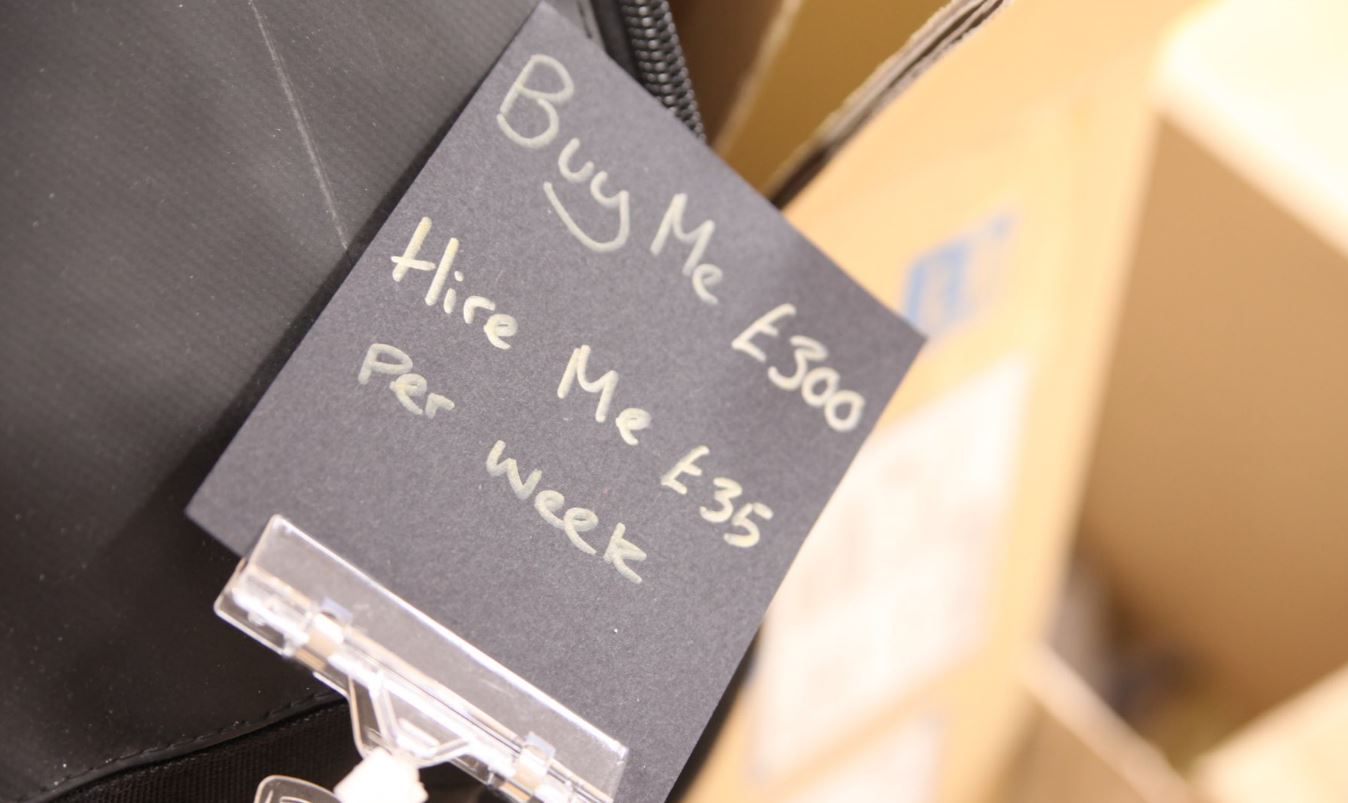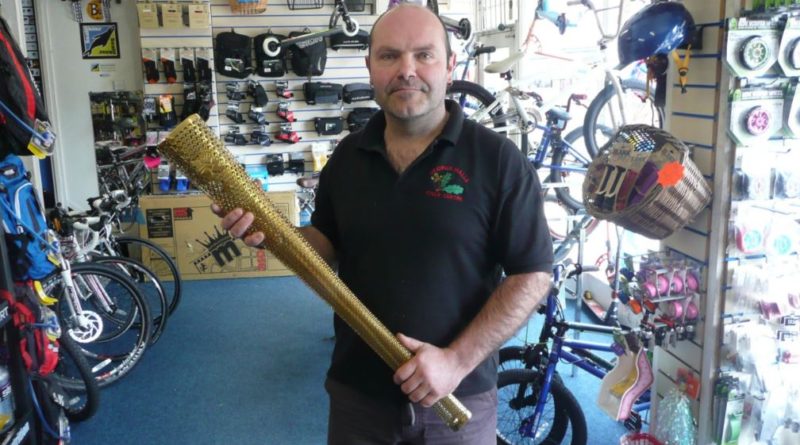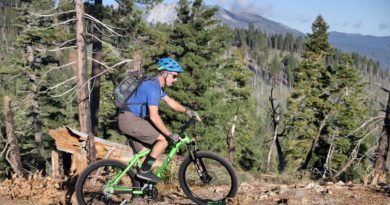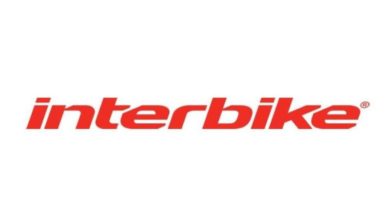Retailer comment: “If you spend time worrying about what others are doing you’ve lost sight of your own business”
Written by Neil Holman, owner of George Halls Cycle Centre & 247cycleshop.com
I have been in the industry since 1985 and have seen lots of changes both in the way we buy our stock and the way we sell our stock. When I left school I had three choices.
- Follow my education
- Join the family business
- Turn my hobby into my employment.
I was very good at maths & science and in the town was Tungsten Batteries, Part of Hawker Syddeley. When I left school they were advertising for apprentices. I had two uncles who worked there so I went to talk to them. They said, although the money was good, there was the once a month blood test for lead poisoning. That put me off.
The family business was window cleaning; great three seasons of the year, but not much fun in the winter.
As far back as I can remember I have always played with bikes, first mending my own and my brother’s and sister’s bikes. Then, as I got older, going down the local rubbish tip and blagging my way to get some of the bikes dropped off there. I would take them home, strip them, occasionally spray them and then sell them on.
So on Monday 1st June, 1985 I went down to the local bike shop, George Halls Cycle Centre and asked for a job. George explained he could not afford to take anyone on as he already had a full-time mechanic, so I convinced him to take me on the government’s Youth Training Scheme. The next day I registered myself with the scheme and instantly got a phone call to say they had found a placement at the bike shop. By 10am I was in the shop working and training and was Rod Gilbert’s apprentice.
Back then, just like now, we were the only IBD in the town and we worked on everything that came through the door. None of this “We will only work on bikes we have supplied” or “Take it back to where it came from”. George’s philosophy was “if we can fix it and there is money to be made, we will.”
George was a pro cyclist from the 50s and 60s and made a name on the six-day track-racing scene. Rod was an excellent all round mechanic, not only on bikes, but motorcycles and cars as well. They were both great problem solvers too. Being in a small market town we used to repair just about anything with wheels from shopping trolleys to golf carts. Two great mentors to have.
I learned very quickly you would never get rich in this job, but the enjoyment, personal satisfaction and variety of everyday goings on would be your life’s fulfillment. You would have to satisfy yourself financially by being prudent, which it still is today, if you want to survive.
Back then, every year we would have two  very busy months for bike sales; July because of school holidays and December because of Christmas and we would sell 120 to 140 bikes in each of these months. During the other months we’d shift about 15 a month. Repairs would come in constantly all year round, but by the end of January things would slow down and in February we would give the inside of the shop a lick of paint. Depending on when Easter was really depended on when the trade would pick up again.
very busy months for bike sales; July because of school holidays and December because of Christmas and we would sell 120 to 140 bikes in each of these months. During the other months we’d shift about 15 a month. Repairs would come in constantly all year round, but by the end of January things would slow down and in February we would give the inside of the shop a lick of paint. Depending on when Easter was really depended on when the trade would pick up again.
As the shop was renowned locally for the clothing we stocked we would get a lot of club cyclists call in. Back then they would come in with Cycling Weekly in their back pocket and ask you to price match Geoffrey Butler, Deeside or Graham Weigh. They always had deals on in the back pages and they would wave the advert under your nose to show the price. We very rarely did give discount.
George would always say, “It’s cheap for a reason and it will take you 5 days to find out why” (meaning the length of time in the post).
This scenario stayed true right through to the late 1990s for us. George was very traditionalist in the fact he was brand loyal and loved a made in Britain stamp.
We were big Raleigh and Dawes stockists. As mountain biking became ever more popular we became Saracen stockists.
Our shop soon started to lag behind many of the other bike shops in the larger towns and cities around us because they had all jumped on board the American or Taiwanese brand band wagon. These got all the headlines in the multitude of cycling magazines and we ended up in a time warp.
I then left George to work for Steve Lawes who owned three shops, one each in Kettering, Northampton and Bedford. I was going to be the mechanic at the Kettering shop, but he asked me to work for my first two weeks at the head office in Northampton so he could see how good I was. I then stayed  there for over a year until he made me the manager of his Kettering shop.
there for over a year until he made me the manager of his Kettering shop.
Within two weeks I had sacked the staff as they just didn’t pull their weight and I employed an up and coming junior mountain biker called James Moore. He won the British Junior downhill championship two years running and was very quick in the cross-country too. Between us we made that shop a success. Steve was a very good businessman and very shrewd and I learnt a lot from him.
In comes the internet
After working for Steve almost two years George approached me to go back to work for him. When I came back I told George said he needed to modernise and needed to start taking credit cards. It was the way the world was going. After a lot of convincing he did and he never looked back.
By the time George wanted to retire in the early 2000s the trade was changing at a great rate of knots. The internet was taking off and more and more companies started to have B2Bs. eBay was in it infancy, but was growing at lightning speed and if you didn’t have a website you were a dead business.
I took over from George in May 2004 and soon learned it was no longer a 9 to 5 job. If I was to take the business anywhere I to had to start again and learn about the internet and computers, websites and modern bicycles. Just like the world, everything was moving and moving fast. Bike development, suspension, indexed gears all started in the early 1990s and by the time I was the responsible one to make the decisions the cycle world had morphed into something completely different to when I had started, but I relished the challenge.
I employed two school leavers to join me and together we rode the crest of the cycle boom wave. Now I was the owner I used my relationships with customers and cashed in favours to have a website built and computers installed at the shop.
I had a second phone line put in so I could have uninterrupted internet access as this was before broadband. One of the school leavers was very tech savvy, so I got him to teach me all about computers and the internet.
When I took over from George there were lots of boxes of odd parts, random spokes, parts ordered in for customers who never collected and old stock, so I set about taking stock of this stuff, photographing it and then listing it on eBay and selling it off to turn it back into useful cash. 
With all the odd stuff I was selling I would get loads of “Question for seller” inquiries asking will it fit X product and if not can you get it.
As companies had launched B2b sites if I didn’t have the part the potential customer needed I would try and find out if it was available and message them back with an answer.
In the first couple of months I turned over about £2,000 selling off the old small parts and it was picking up every month, more questions and more sales. By the end of my first year selling online I have taken about £20,000. Bearing in mind my average sale was about £10 that’s a lot of sales.
A riding buddy of mine was a lecturer in IT and computer science, so I quizzed him for months about building my own site. With his help I used an online website building site and one of their templates and after a winter of data loading and with the profits made through the sales on eBay I launched my own site – 247cycleshop.com – which is still going strong. Another old riding buddy of mine builds e-commerce sites for a living so I employed him a couple of years ago to build me a new site and that when live just over a year ago. Growth is steady.
On Bikebuzztrade forum a short while ago someone put up a thread about diversifying your business.
A couple of things I learnt from George & Steve is as a small business you can diversify quite easily, quickly and never upset a fellow shop owner or supplier because you never know when you will need them.
My bricks and mortar business has gone from selling 700 or more bikes a year ten years ago. Halfords came to town reducing this figure to under 200 in 2016, but my workshop has gone from turning over £40,000 10 years ago to £120,000 in 2016.
We have really gone from a cycle centre servicing bike to a service centre selling bikes.
My online business has gone from very humble beginnings to turning over £120, 000 in 2016 and again bearing in mind my average sale is under £10 that’s a lot of orders being posted out.
We will be giving up most of our clothing stock in 2017 as we have turned into a showroom for online sellers. Customers call in try on for size and then walk off, most don’t even ask you if you would price match. We’ve also had to consider that a Mountain Warehouse, Aldi & Lidl has opened locally, all selling cheap cycle clothing. So it is time to move on.
We jumped onto the micro scooter bandwagon six years ago and it is still going strong for us, we sell more scooters than bikes now.
We get phone calls everyday from other cycle shops asking if we can help them with either spokes or brake lever hoods, two of our best online sellers and I will always look at the wanted section on the industry forums to see if I can help fellow IBDs. The nearest IBD to me is at least 10 miles in any direction and I get on great with them all, even recommending them to customers if they ask for a certain brand and I can’t convince them to buy the brand I have.
I have a great rapport with many of the company reps that call on me and they will recommend me to other shops as a place to try for certain things.
I think if you spend time worrying about what others are doing you have lost sight of your own business.
I read all the time about businesses blaming the online giants like CRC Wiggle, Highonbikes, Merlin, and Ribble for the downfall of their business. My answer is no, you are the reason your business has failed, you haven’t diversified, you haven’t adapted and taken into consideration what is happening around you.
I can speak from experience.
Not long after I took over the business, against my partner’s wishes I expanded the business premises. I
had always wanted a separate clothing section and the shop next door came up so I took on the lease. I had outdoor clothing downstairs and cycling clothing upstairs. There were two other shops within the town that did outdoor clothing, but they had the “Fashion” brands, so I took on Regatta & Helly Hansen and a fashion brand called Wacky Bat. This side soon took off and we were selling through constantly, but then after about 18 months to 2 years one of the shops which was part of a small chain went bankrupt and the other the owners sank a lot of money into a different venture that went belly up.
Because I had lost my town competition, people would come in, try on and then go off to the surrounding towns & cities to see what else was about before buying there. Halfords opening on the outskirts of town hit my sales very hard and I had to look at other things.
First of all, I had to lose the dying limb, so I closed the clothing section down and sub let the property. Then I looked inwards on where I could save money within the business.
First on my list was bank charges. By banking my cash into my own personal account and then transferring it across through internet banking I saved myself up to £30 a week. Second on my list was PDQ machine charges. I swapped my supplier and saved over £100 a month. Next I swapped my energy supplier saving me £50 a month. I then changed my phone line provider saving me £30 a month. Finally, paying suppliers early to get the discount settlement gave me on average £80 a month. I was quite an eye opener after a short while how much money I had saved with just a few changes.
I went to a few local free sales seminars put on my either the local chamber of commerce or my bank and these gave me new ideas. I remember two of the mantras still today. These are:
Make the invisible visible: 
Branding is essential. I had a logo drawn up and header cards printed so everything that didn’t some in a packet was put in a bag and with a header card attached.
We made the workshop more visible, we went from listing complete kits etc on our website like everyone else to breaking the kits down so customers could buy a single pump washer or a single spoke. We even listed the individual parts in supplier’s small part services boxes we had in our workshop on our site and we promoted, and still promote, the fact there has been a bicycle shop on site since before 1898 (and due to this we are in the Mannheim Museum celebration for 200 years of the BSO).
Little, but often.
We stopped the big buy in deals. Why, for example, should Zyro have all our capital and we have all their stock? So we started ordering when we needed too and paid the carriage charge. What’s the point of making a £150 order for a £20 part just to save £10 on carriage. There isn’t one.
I have always been a busy person and since taking over the business I have been busier still, not only do I run my own business from 7am to 6pm six days a week, but I co-ordinate the UK’s oldest continuous mountain bike cross-country series and organise 2 events within it. Furthermore, I sit on committee’s within the world of cycling, run a family, I am a British cycling assistant MTB commissaire. I still have the same passion today as I had 31 years ago when I first started.
More recently I have been helping Rob Kemp write a few pieces for Cycling Plus and BikeRadar.
I was once told any publicity about your business is good publicity and when Russell Crowe had his bike mended at our shop and he collected it in person, (he was filming Les Miserable close by) we made the most of the local press and we have the cutting framed and hung up on our shop wall. It is always a great talking point.
I have always said as soon as I lose that passion and I find it a chore to come to work I will walk away.
Neil Holman
Owner of George Halls Cycle Centre & www.247cycleshop.com
Chairman & Founder member of CATS Mountain Bike Club
Founder of The Harborough Wheels Project
Secretary & Founder member of Friday Night Summer Series
Event organiser within Midlands Mountain Bike Orienteering
British Cycling MTB Commissaire



